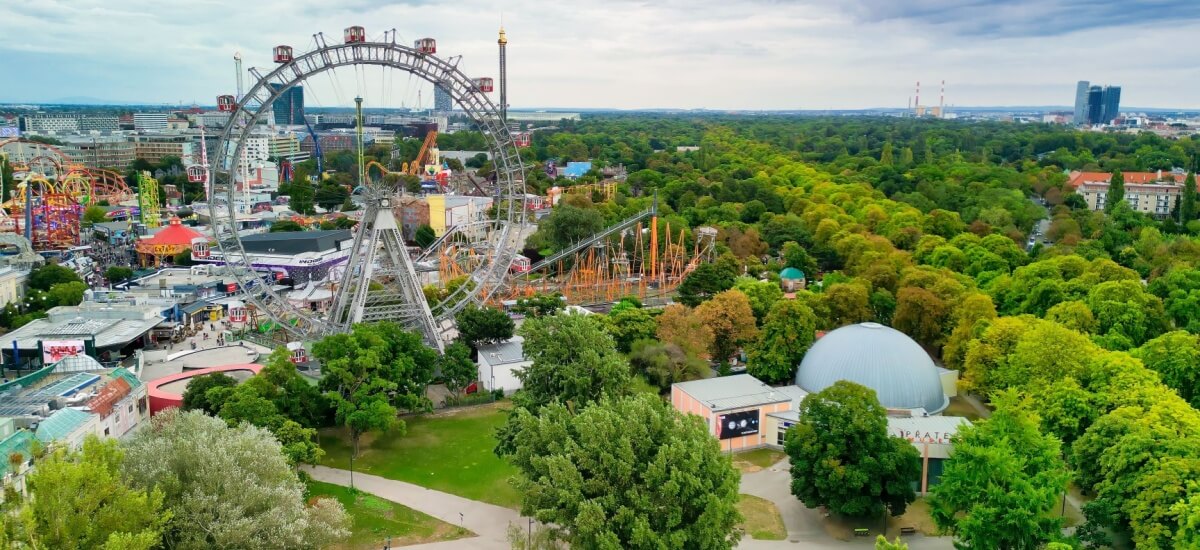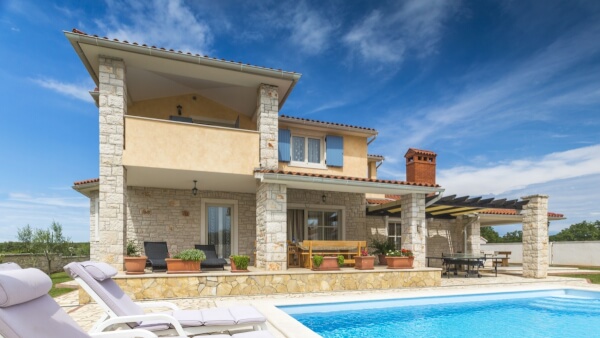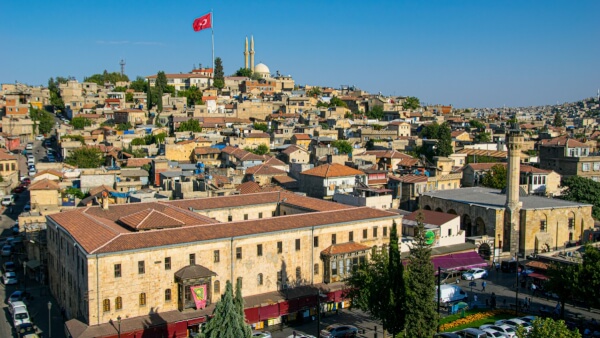What is the 'Nota Simple' in Spain and how do you get one?
Everything you need to know about the Nota Simple in Spain - an essential document for buying property - including how you can get it and how much it costs.

Moving to Austria from the UK? One of the first things you might need to organise is somewhere to live.
You might rent for a while before buying somewhere, or you might dive right in and buy a property. Many UK expats also buy holiday homes and investment properties in Europe.
Whatever your plans, we’re here to help with a comprehensive guide to buying property in Austria as a foreigner. Read on for tips on starting your house hunt, the latest Austrian property prices, and info on taxes and fees for buyers.
If you’re looking for ways to save money on currency exchange when buying property in Austria, check out the money services provider Wise. You can send large transfers with Wise for low fees* and great exchange rates - making it ideal if you’re sending a secure international transfer.
Before you start your house hunt, it can be useful to know a little about how the process of buying property works in Austria.
Here’s a quick overview of the steps involved:¹
Before you do anything, it’s crucial to get your finances in order. You need to set your budget, get a mortgage offer in place and define exactly what you’re looking for.
Then you can use online property portals and/or local estate agents to find properties. We’ll run through some tips later on how and where to start your search.
Found somewhere you like? Move quickly before someone else snaps it up. Arrange a viewing as soon as you can, and start researching the area in the meantime.
Once you’ve found your dream home, you’ll need to make a competitive offer or bid in writing. You’ll submit it either to the real estate agent or directly to the seller.
An important thing to remember is that in Austria, a verbal expression of intent to purchase can be legally binding.² So, make sure you’re committed to buying before expressing interest or submitting an offer.
Before your offer can be considered, you might be asked for evidence of how you’ll finance the purchase. This will mean producing evidence of your mortgage agreement or a letter from your bank or lender.
If your offer is accepted, the next step is for both parties to sign the pre-sales contract. In Austria, this is known as the Kaufanbot and it’s legally binding.
At this stage, you might want to contact your mortgage provider to finalise the financing for your purchase. It’s also a good time to arrange for a building survey or inspection to be carried out.
After signing the Kaufanbot, you will also need to arrange to pay your deposit. This is usually 10% and it’s paid to the notary handling the sale. They work for both buyer and seller. The notary will ensure your deposit is held in escrow until the purchase is finalised.
If you need to apply for a permit to buy property in Austria as a non-EU citizen, now is the time to apply.
This is the final sales contract, and should be signed by both parties in the presence of a notary. Or if you’re not in Austria at the time, you can sign it in front of official witnesses at an Austrian Embassy or Consulate. At this stage, you’ll also need to arrange the transfer of the remaining balance.
Once both buyer and seller have signed the contract, the notary prepares the title deeds and enters them into the Land Registry.
And then all that’s left is for you to pick up the keys to your new home.
| 💡 Read more: How to transfer large amounts of money from the UK? |
|---|
Austrian banks and providers do offer mortgage loans to foreigners, but the conditions, requirements and rates may differ compared to how it works for locals.
For example, you might be asked to provide more extensive documentation as part of your application.
The requirements for application will vary between banks, but generally you’ll need valid ID, proof of salary/employment and the details of the property you’re buying.
You might also be asked for proof of a residential address in Austria, which can make it difficult for non-residents to get a mortgage from an Austrian bank.
It’s not absolutely essential to have an Austrian bank account or international account in order to get a mortgage, but it might make the process easier.
Alongside the property price, you also need to budget for the fees and taxes which may apply to your Austrian property purchase.
Here are the essential costs you need to know about:²

Austria’s property market is pretty stable, and wasn’t even too badly affected by the COVID-10 pandemic in 2020.
Although prices have been rising steadily year-on-year, the country is still considered reasonably affordable for house buyers compared to many of its European neighbours.²
As you’d expect, property prices are highest in major cities like Vienna and are rising more quickly than in other areas.²
Yes, foreigners can buy property in Austria, but the process and requirements vary depending on your nationality.
EU and EEA citizens can buy property just like a local, and the process is usually pretty straightforward.
But for non-EU citizens like buyers from the UK, a permit may be required. The rules vary between regions, with stricter ones in force in certain areas (i.e. in the pristine ski resort areas of Tyrol and Vorarlberg).²
According to the Austrian government, permit applications are likely to be approved if the purchase meets the following criteria:²
So, you’ll need to check the requirements in the area you’re looking to buy in, and make sure you apply for any required permit in plenty of time.
There’s no direct route to permanent residency through the purchase of property in Austria. In fact, you might need a residence permit in order to buy property in the country.³
To apply for residency there as a non-EU national, you’ll usually need to go down the route of employment, starting a business, studying or having family ties in Austria.
So, how much money do you need to spend to buy your dream home in Austria?
Property prices are a little more expensive than the UK. On average, you’ll pay nearly 10% more per square metre for a city centre apartment, and around 5.4% more per square metre outside a city centre.⁴
Although of course, it depends where and what you buy.
To narrow it down a little further, here’s a guide to what you can expect to pay per square metre in some of Austria’s major cities:⁵
| City | Average apartment price per sq.m - city centre | Average apartment price per sq.m - outside city |
|---|---|---|
| Vienna | €8886 | €5668 |
| Salzburg | €6800 | €5585 |
| Graz | €6583 | €4316 |
Remember though that property prices will also vary depending on the type of property.
Another thing to note when figuring out the price for property in Austria is that international transfers could get expensive, especially if the provider adds a margin to the exchange rate to convert your pounds. Consider checking out Wise to securely handle your large transfers with mid-market exchange rates and low, transparent fees*.
In terms of the major cities in Austria, Graz is the cheapest. Another relatively affordable city for property is Klagenfurt am Wörthersee, which is in southern Austria close to the border with Slovenia.⁶
If you’re on a tight budget, you may be best looking outside of city centres and popular urban areas.
The two main routes to find property to buy in Austria are local real estate agencies and online property websites.
It isn’t necessary to use a real estate agent to find a property to buy overseas. But it can be helpful, especially if you’re moving to Austria from the UK and are unfamiliar with the local property market.
You can also search for property in Austria online, from the comfort of your current home in the UK.
Here are some popular Austria real estate websites to check out:

Like much of Europe, Austria is considered to be a safe place to buy property.⁷ But there are some pitfalls and risks to look out for.
Firstly, there’s the language barrier. If you’re not a fluent German speaker, you might find it extra difficult to get to grips with the intricacies and complexities of the Austrian property market.
Here are some other important things to be aware of:⁷
And of course, you should take all possible measures to protect yourself from scams and fraudsters.
Your search criteria will be the main thing which determines which is the right property for you. The most important factors will be location, the type of home and of course, how much you can afford to spend.
If you’re not already living there, it’s worth making a trip to the specific town or city in Austria you’re interested in. You’ll want to check out the local area and view properties, making sure to pay attention to local transport links and amenities.
It’s a good idea to do as much research as possible before committing to purchase a property. A crucial step is checking the land registry (Grundbuch) to check the legal status of the property, as well as if any building conditions, charges or other restrictions are registered against it.
You’ll also want to commission a building survey or inspection, which will flag up any major issues and give you a better idea of what you’re buying.
Before you can get the keys to your new home, you’ll have a final few tasks to check off your list.
These include taking out insurance, setting up your utilities and carrying out any energy efficiency renovations.
It’s strongly recommended to take out a buildings insurance policy starting from your completion date. You might also want to arrange the contents cover too.
If you know when your completion date will be, it makes sense to get some essentials set up in advance of moving in.
A prime example is utilities, such as heating, power and water. Get these sorted as early as you can, and the moving process should be a little smoother.
Purchased an Austrian property with an older heating system or minimal insulation?
From heating and insulation upgrades to double glazing and draught proofing, there are lots of things you can do to improve the energy efficiency of your new home.
And there you have it - our comprehensive guide to buying property in Austria for foreigners.
We’ve covered all of the essential info you need to know, including tips for starting your search, average property prices in Austria and what fees and taxes are involved. You should also now have a better idea of how the buying process works in Austria.
And, if you want to save money while buying your new property in Austria, make sure to use the Wise account to send your international transfer. It’s not a bank account but offers many similar features.
Here are the main benefits for using Wise: |
|---|
|
Sources used:
Sources last checked on date: 25-Oct-2024
*Please see terms of use and product availability for your region or visit Wise fees and pricing for the most up to date pricing and fee information.
This publication is provided for general information purposes and does not constitute legal, tax or other professional advice from Wise Payments Limited or its subsidiaries and its affiliates, and it is not intended as a substitute for obtaining advice from a financial advisor or any other professional.
We make no representations, warranties or guarantees, whether expressed or implied, that the content in the publication is accurate, complete or up to date.

Everything you need to know about the Nota Simple in Spain - an essential document for buying property - including how you can get it and how much it costs.

Read our guide on how to transfer money to buy property overseas, including all of the best options for UK residents and steps to set up a large transfer.

Read our guide on how to transfer money to buy property in Spain, including all of the best options for UK residents and steps to set up a transfer.

Read our complete guide to selling your property in Barbados, including info on the process, fees, taxes, legal requirements and more.

Read our comprehensive guide to getting a mortgage in Turkey from the UK, covering everything you need to know.

Read our essential guide to property tax in Turkey for foreigners and UK expats, including taxes on buying, selling and renting out property.